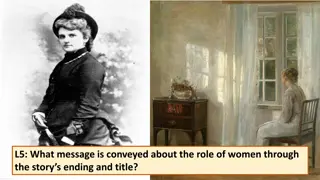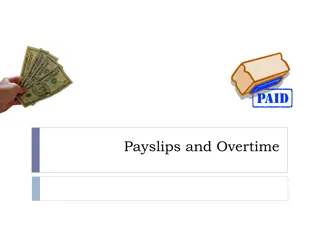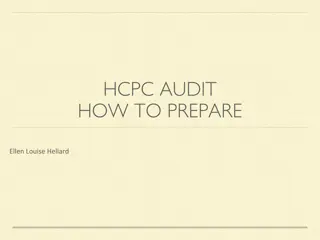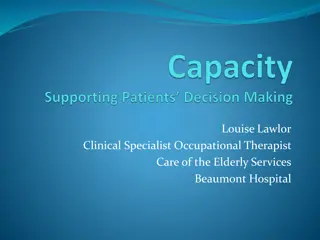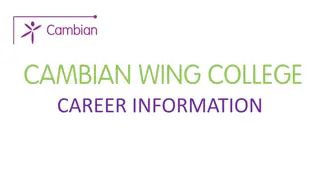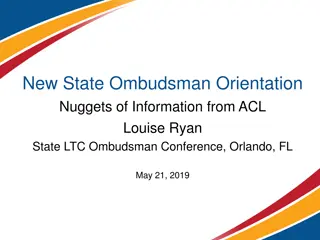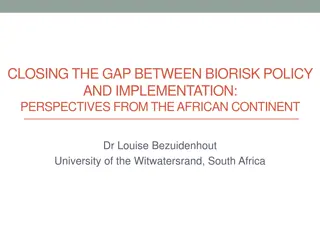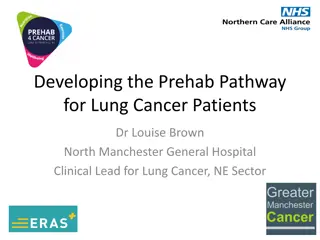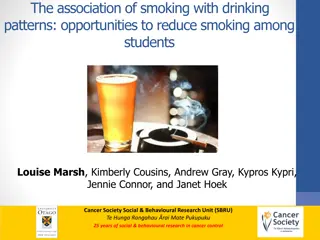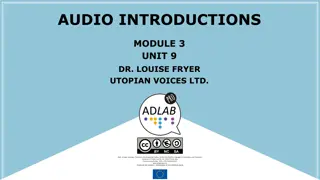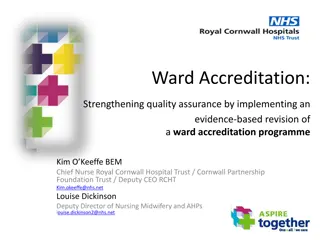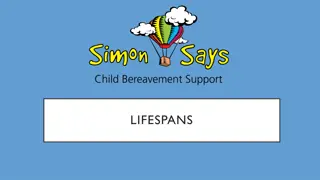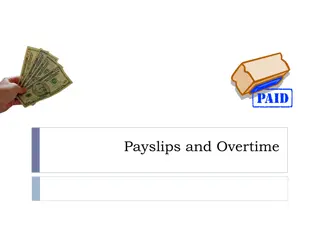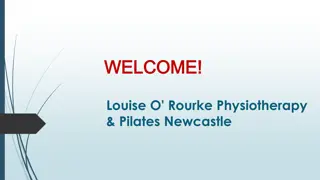Advocating for People with Disabilities in the Criminal Justice Context
Louise Loughlin, National Manager of the National Advocacy Service for People with Disabilities (NAS), leads a team providing professional, independent, and confidential advocacy services across Ireland. NAS supports individuals with disabilities involved in the criminal justice system, including those accused of serious crimes, victims of crime, and those in need of support post-release. The organization also offers a Patient Advocacy Service for hospital patients. Referrals come from various sources such as HSE, probation services, and family members. The advocacy support offered includes communication with law enforcement, legal representation, court attendance, and assistance with accessing support services and protection orders.
Uploaded on Dec 16, 2024 | 0 Views
Download Presentation

Please find below an Image/Link to download the presentation.
The content on the website is provided AS IS for your information and personal use only. It may not be sold, licensed, or shared on other websites without obtaining consent from the author. Download presentation by click this link. If you encounter any issues during the download, it is possible that the publisher has removed the file from their server.
E N D
Presentation Transcript
Advocating for People with Disabilities in the Criminal Justice Context Louise Loughlin, National Manager National Advocacy Service for People with Disabilities (NAS)
About NAS Established 2005 as pilot projects, national company since 2014. Funded and supported by the Citizens Information Board. Partially meets CIB statutory obligation to provide an advocacy service for people with disabilities. Fully professional, independent, free and confidential service. Independent of the HSE- no HSE funding. 50 paid, professional staff across Ireland. NAS also launched a new, independent Patient Advocacy Service in October 2019 (patientadvocacyservice.ie).
NAS launched a new independent Patient Advocacy Service in October 2019. We have a team of patient advocates helping patients of public acute hospitals to make a complaint about the care they have experienced. Service is free, independent and confidential. Funded by Department of Health. Patientadvocacyservice.ie national line: 0818 293 003.
Types of Referrals People accused of serious crime - doubts re. capacity to understand proceedings. People with disabilities taken advantage of by others in the course of committing crimes. People who are not charged and are in community without supports. People being supporting on other matters where criminal charges are pending. Referrals from probation service of people leaving prison or with probation orders. Support for victims of crime to take part in interviews, report crimes and receive appropriate supports.
Sources of Referrals HSE and HSE funded Disability Services Probation Service Irish Prison Service Social workers and psychologists Solicitors Medical professionals Family members Self Referrals
Types of Advocacy Support Communication with Garda Siochana: Attending interviews / People being harassed. Providing info to legal reps on advocacy & disability services. Support people to communicate with legal team. Support people to attend psychiatrists and psychological evaluations. Attendance at court during hearings and trial. Support people to engage with probation, or at case meetings/MDT s. Support to apply for protection orders, report crimes, meet support services.
Issues for Consideration Long term and complex nature of most of this case work. Understanding of courts and professionals about representative advocacy. Reasonable accommodations required by all parties who may have support needs. Education of criminal justice professionals re. ADM, capacity, communication skills etc. Need for supports for people who communicate differently. Need for HSE & disability services to provide enduring supports for people with disabilities. Safeguarding issues which arise and possible need for referrals for screening.
Supporting People Accused of Crimes
Case Study: Tony Tony has aphasia which affects his speech and comprehension. He has been on remand since early 2019, accused of murder. Tony masks his communication difficulties so is vulnerable in the prison environment. Court hearings have been by video link and Tony has struggled to process information, understand it and respond. The NAS Advocate is preparing a communication plan for meetings with Tony online. His trial may be delayed, hopefully giving more time to prepare communication supports if they are needed during trial.
Case Study: Yvette Yvette is serving a prison sentence for public order offences. She has complex mental health issues and is an undocumented immigrant. The NAS advocate is supporting Yvette to cope in prison, helping her to prepare for release, and dealing with her legal team regarding issues surrounding her immigration status. Recent communication during the Covid crisis has been via Zoom meeting facilitated by the prison.
Case Study: Michael Michael has a moderate intellectual disability and attends a day service. He was accused of a sexual assault offence in early 2019 by someone else attending the day service. Michael was told he could not attend his day service pending the investigation. The NAS advocate contacted Gardai on Michael s behalf about the investigation and was told there was no investigation. The advocate supported Michael to meet a solicitor for advice and helped him get counselling for anxiety. The advocate also supported Michael to attend another disability service and address issues regarding housing and his mental health.
Case Study: Breda Breda, who has a moderate intellectual disability, has three children who were taken into care. She was supported by a NAS advocate when criminal charges were taken against her, alleging neglect of her children. She found it difficult to understand what was going on at legal consultations and pre- trial court hearings. She struggled with stress and anxiety. The NAS advocate worked with her legal team to identify psychiatrists who showed she did not have the capacity to stand trial. The judge ruled in her favour and the case was dropped.
Supporting Alleged Victims of Crimes
Case Study: Billy Billy has an intellectual disability and has experienced mental health difficulties. He lived with his elderly father and step mum who both had disabilities. Billy was charged with several serious offences relating to a member of his family. He had to stay in his home and was subject to threats to his safety. The NAS advocate supported him to report the serious threats, meet with gardai and access temporary accommodation. The advocate also assisted Billy s legal team to identify psychiatrists who showed he could not participate in the legal process. The judge saw grounds for seeking committal, as Billy was not unwell. When the trial ended the advocate helped contacted Billy access support services. This case took 7 years to conclude.
Case Study: Joe Joe has an intellectual disability. He was accused of a serious crime but lacked understanding of their criminal proceedings. He was the victim of a vigilante style group who accused him of a serious crime and streamed it on social media. Joe was questioned by Garda who took his mobile phone. He had no supports or appropriate adult. The NAS advocate supported Joe to engage with a solicitor about the case. He lost his place at his day service. The advocate is helped him link with disability services and access alternative day placements/activities.
Case Study: Patrick NAS received a referral from HAIL Housing to work with Patrick who was in prison. Patrick has an acquired brain injury and cannot communicate verbally. He was due for release but was homeless. There was ongoing difficulty sourcing housing and supports. The NAS advocate is working with Patrick to carry out his wish to return to the community and is seeking to acquire the necessary housing/supports for him.
Case Study: Niamh NAS worked with Niamh regarding simultaneous criminal and child care proceedings. Niamh experienced poor mental health. She was charged with dangerous driving causing death and her children were taken into care. The NAS advocate supported Niamh to liaise with her legal team and to attend psychological assessment/parental capacity with the CMH. Niamh got a suspended sentence and a probation services plan was put in place. Over several years, the advocate supported Niamh at meetings with social workers and child in care reviews. The advocate helped her get more appropriate housing and a family reunification plan was agreed. Niamh now has full care of their children and is living in the community of their choice.
Conclusions Access to advocacy is essential for those who may be vulnerable as either a witness or an accused person. Provision of advocacy can make the difference between a person s ability to comprehend complex legal proceedings or not, and therefore whether a case proceeds or not. Understanding of different communication needs and reasonable accommodation has a long way to go.


